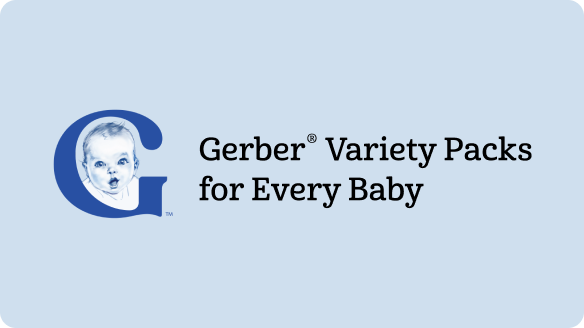Factors Impacting Iron Status in Infants
5 min read • By: Gerber Medical Hub

Test Your Knowledge
Which of the following impacts an infant's iron status in the first year of life?
- Maternal iron status during pregnancy
- Breastfeeding
- Iron rich complimentary foods
- All of the above
d. All of the above
Adequate iron status in the first years of life is essential to brain and cognitive development. The effects of inadequate iron intake even without anemia are detrimental to a child's development. Identifying infants at risk for low iron intake early and monitoring into toddlerhood are important steps to help ensure healthy brain and cognitive development.
A pregnant woman's iron status impacts her infant's natural iron stores- therefore getting enough iron during pregnancy has an important connection to infant health. According to a recent Morbidity and Mortality Weekly Report from the Centers for Disease Control and Prevention, there has been a 13% increase in the prevalence of anemia from 2008 - 2018 among pregnant women participating in the Special Supplemental Nutrition Program for Women, Infants, and Children (WIC). The 2020-2025 Dietary Guidelines for Americans identified the need for increased iron during pregnancy and the importance of a diet that includes iron-rich foods. Infants born to mothers with low iron status may be at risk of having low iron stores at birth and these stores may be depleted sooner than infants born with adequate iron stores. Additionally low birth weight and premature birth may also result in lower iron stores at birth and along with rapid growth may contribute to risk of iron deficiency.
Infants rely on their iron stores at birth for the first months of life. Around 4-6 months of age, those stores are depleted and dietary iron is needed. This is one reason complementary feeding is recommended to start around 6 months of age. Breastmilk is the ideal source of nutrition for infants during the first year. However, the iron content of breastmilk is low, making iron rich complementary foods especially important for breastfed babies. (Dietary Guidelines for Americans ). Breast fed babies without iron in their diet starting around 6 months of age are at increased risk for poor iron status.
Adequate iron intake may also be a concern for partially breastfed and fully formula fed infants. According to the American Academy of Pediatrics, "Iron intake in infants between 6 and 12 months of age should be 11 mg per day". As reported by Bailey et al, 2016 , 18% of infants between 6-12 months are not getting enough iron in their diets. And, a 2022 study by Finn et al revealed that nearly all breastfed babies (96%) and most partially breastfed babies (70%) who do not eat infant cereal fall short on iron in their diet. While meats, seafood, and some vegetables can provide good sources of iron, infant cereals remain the top complementary food source of iron (Abrams 2021).
Addressing the factors affecting the iron status of infants and toddlers remains a concern in the U.S. and warrants consideration by pediatric healthcare practitioners to help address this public health issue.
Helpful Suggestions for Providers:
- Be familiar with the factors that may negatively affect infant iron status -- including maternal anemia, low birth weight or premature birth, and delay of introduction of iron rich complementary foods.
- At about 4-6 months of age, recommend complementary feeding with iron- and zinc-rich foods such as iron fortified infant cereal and meats for infants who are developmentally ready.
- Recommend caregivers offer infants a variety of iron fortified infant cereals made from grains like oatmeal, barley, and multigrain.
- Rice cereal does not need to be the first food given to infants and should not be the only grain provided to infants.
- Screen for iron status between 9-12 months with careful follow up.
- For infants who are not regularly receiving iron containing foods, consider evaluation of iron status by serum ferritin or similar marker.
- Recommend iron-rich foods such as meat and fortified infant cereal
- Infant cereal is an excellent source of iron through the first year of life and also provides a variety of whole grains and other nutrients.
Additional Articles and References
- Anemia Among Pregnant Women Participating in the Special Supplemental Nutrition Program for Women, Infants, and Children — United States, 2008–2018
- Breastfed and mixed fed infants who do not consume infant cereal are at risk for inadequate iron intake: data from the feeding infants and toddlers study 2016, a cross-sectional survey
- A Substantial Proportion of 6- to 12-Month-Old Infants Have Calculated Daily Absorbed Iron below Recommendations, Especially Those Who Are Breastfed
- Are Breastfed Infants Iron Deficient? The Question That Won't Go Away
- Total Usual Nutrient Intakes of US Children (Under 48 Months): Findings from the Feeding Infants and Toddlers Study (FITS) 2016
- American Academy of Pediatrics - Healthy Children
- Dietary Guidelines for Americans 2020-2025
- New dietary guidelines address infants, support healthy dietary patterns
- Consumption Patterns of Infants and Toddlers: Findings from the Feeding Infants and Toddlers Study (FITS) 2016
- Iron status of toddlers, nonpregnant females, and pregnant females in the United States



